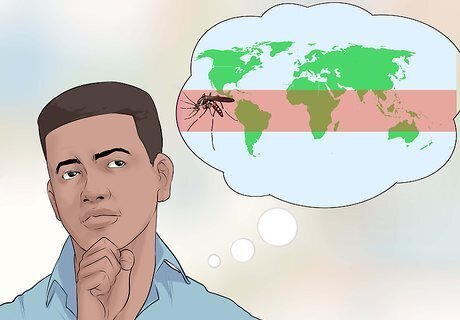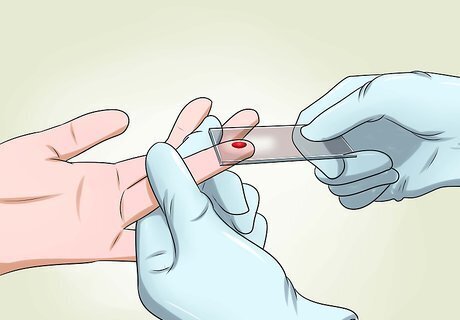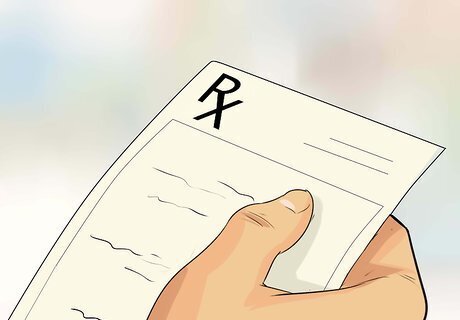
views
X
Trustworthy Source
Centers for Disease Control and Prevention
Main public health institute for the US, run by the Dept. of Health and Human Services
Go to source
The mosquito develops the parasite after biting a person infected with malaria, which is then transmitted to the next human it bites. Malaria is common in over 100 countries, and around 300 million people get infected globally each year.[2]
X
Trustworthy Source
Centers for Disease Control and Prevention
Main public health institute for the US, run by the Dept. of Health and Human Services
Go to source
Experts note that if you've been to an infected country and you are showing the symptoms of malaria, you should seek medical care right away to start getting treatment.[3]
X
Trustworthy Source
Centers for Disease Control and Prevention
Main public health institute for the US, run by the Dept. of Health and Human Services
Go to source
Recognizing Malaria

Notice the symptoms of malaria. There are some common symptoms that occur when you contract malaria. You may have some or all of these symptoms at some point while you are sick. The symptoms include: High fever that ranges from 101 to 104°F (38.3 to 40°C) Chills and involuntary chills, called rigors Headache Sweating Disorientation about your identity and location General confusion Body aches Vomiting Diarrhea Jaundice, or yellowing of the skin, which occurs due to busted blood cells

Know where malaria occurs. There are parts of the world where malaria is common, known as malaria-endemic countries. These countries include most of Africa except the most northern and southern areas, northern and central areas of South America, India and the surrounding areas, and many of the Pacific Island nations. Malaria is also present but not endemic in most of Asia, parts of central South America, western Mexico, and most of Central America. Although malaria is endemic in these countries, it is less common in areas that are high in altitude and in desserts, except in oases. It is also less common during colder temperatures. In areas near the equator, it is hot year round, which means malaria is more concentrated and you can contract it all year long.

Wait for symptoms to manifest. The incubation period, or time before the symptoms appear, is typically seven to 30 days from the time you get bitten by the infected mosquito. Certain types of the malaria parasite can lay dormant and not cause symptoms for up to four years after you get bitten. The parasite remains in the liver but eventually invades the red blood cells.

Diagnose malaria. You can be diagnosed with malaria no matter where you are. There are doctors that know and can recognize the symptoms all over the world. To get diagnosed, a single drop of blood will be taken and evaluated under a microscope. The doctor will check for the presence of the parasite inside your red blood cells. This is the most definitive test, since you can actually see the live parasite in your blood cell. This is complicated by individuals falling victim to other tropical diseases while being immune to malaria. In the United States, physicians are not trained in tropical medicine, which causes the diagnosis of malaria to be missed 60% of the time.

Watch out for cerebral malaria. Cerebral malaria is a late stage manifestation of malaria. Malaria parasites have the ability to penetrate the blood-brain barrier, which is one of the worst problems associated with malaria. If you have cerebral malaria, you may experience coma, seizure, altered consciousness, abnormal behavior, and other changes in sensory perception. Go to the hospital immediately if you think you have cerebral malaria.
Preventing and Treating Malaria

Use extra precautions. There are some precautions you can take to prevent malaria, especially in countries where malaria is common. When spending time or sleeping outside, always use mosquito netting. This will prevent possibly infected mosquitoes from biting you. Also try to eliminate or avoid pools of standing water. These serve as breeding grounds for mosquitoes. Make sure you also use plenty of insect repellent if you plan to be outside without netting.

Take preventative medication. If you plan on traveling to areas where malaria is common, it is important you see your physician at least four to six weeks prior to your trip. At this time, they will likely prescribe medications for the prevention of malaria, which will help lessen the likelihood of you contracting malaria. These should be taken before, during, and after your trip.

Treat malaria. The key point in the treatment of malaria is to catch it early. See a doctor for diagnosis within 24 to 72 hours of your possible infection or when your symptoms appear. There are many medications that you can take, which will be taken for a minimum of seven days. However, the length of time you need to take the medications will vary depending on the severity of your case and how much the rest of your body has been affected. All malaria medications are safe for children. Possible medications you may be prescribed include: Mefloquine Atovaquone-proquinal Sulfadoxine-pyrimethamine Quinine Clindamycin Doxycycline Chloroquine Primaquine Dihydroartemisinin-piperaquine, though its effectiveness has yet to be cleared

Seek immediate medical care. Since doctors in the US are not as aware of malaria issues, you have to be extra vigilant if you live there. If you arrive back in the US and have a fever for any reason, head directly to the emergency room or doctor’s office. Tell your doctor exactly where you have traveled and that you suspect malaria so they can treat you promptly. A delay in diagnosis can result in death. 60% of diagnoses are delayed because of misdiagnosis of malaria as other diseases. To prevent this, always give an adequate history of where you have traveled in the last year or two. If you contract malaria, you will hospitalized so the doctors can properly administer the antibiotics.



















Comments
0 comment